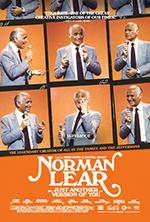Glenn here with our weekly look at documentaries from theatres, festivals, and on demand.
 We get told time and time again that we are in a golden age of television, and it’s impossible to deny that the expansion of the viewing landscape has resulted in a boon of creativity that can be seen in every single corner of the television globe. There are times throughout the brisk Norman Lear: Just Another Version of You where it appears directors Heidi Ewing and Rachel Grady are attempting to suggest that this golden age was birthed some 40-odd years ago when Norman Lear was the centre of the small screen universe with a collection of series to his name that not only snagged record-busting ratings, but also critical acclaim and pop culture buzz that saw his shows watched by some 120 million American a week.
We get told time and time again that we are in a golden age of television, and it’s impossible to deny that the expansion of the viewing landscape has resulted in a boon of creativity that can be seen in every single corner of the television globe. There are times throughout the brisk Norman Lear: Just Another Version of You where it appears directors Heidi Ewing and Rachel Grady are attempting to suggest that this golden age was birthed some 40-odd years ago when Norman Lear was the centre of the small screen universe with a collection of series to his name that not only snagged record-busting ratings, but also critical acclaim and pop culture buzz that saw his shows watched by some 120 million American a week.
You could say he was like David E. Kelley and Shonda Rhimes of his day.
While guest appearances by the likes of Amy Poehler, Jon Stewart and even George Clooney highlight his influence both creatively and politically, Ewing and Grady’s film is far too concerned with the man himself to truly dive into the reverberations of his work on modern television...
Wouldn't it have been far more interesting to see how great moments in modern TV like, for instance, Peggy on Mad Men so eloquently detailing giving her baby up for adoption wouldn't have existed without Bea Arthur's Maude choosing to have an abortion on an episode of television viewed by over 65 million people in prime time? Certainly more so than hearing how how Lear owns the Declaration of Independence. At one point, prominent TV producer Philip Rosenthal even says as much:
Television can be broken into two parts – before Norman and after Norman.
And while that sentiment is certainly true, Just Another Version of You trades on its audience’s knowledge of this concept more than actually demonstrating it. [more...]

Lear – in case you didn’t know – is the creator of All in the Family, Maude, The Jeffersons, Good Times, and many more with many of those series’ most prominent moments featured. In an effort to not simply be wall-to-wall clips, Ewing and Grady utilize a device in which Lear watches projections of clips and chart his reaction all these decades later. It’s effective to see the man get obviously very emotional watching famous television moments like Archie Bunker being confronted by his racism as he witnesses a Puerto Rican woman given birth in an elevator. Another storytelling device involving a child version of Lear is admirable as a means of adding some visual flavour to the story, but is less necessary.
What the film could have used more of, however, was the likes of Esther Rolle who starred in Good Times and speaks of her clashes with Lear in her efforts to have an African American family represented on television without buffoonery. It is scintillating to hear her speak so frankly while surrounded by so much fawning politeness of how she thinks Lear failed at this by sending Jimmie Walker’s character and his catchphrase of “dyn-o-mite!” into the stratosphere of popular culture. “To make him the most popular black in America”, Rolle says, “was putting us all down.”

Moments like this are too fleeting, but this is something we have come to expect from this sort of overly reverential, uncritical paean documentary, the likes of which we are seeing with more and more frequency. Ewing and Grady – Oscar nominees in 2007 for Jesus Camp – have made an entertaining film, and one that will likely inspire much warmth in older audiences, but as a work of filmmaking it lacks enough of those truly special moments to transcend mere tribute and work as cinema.
Release: Opens this week in NY, next week in LA, before opening around the country. Will air on PBS later in 2016.
Oscar Chances: The affection many have for Lear will not likely be enough to prevent the film being over-shadowed by bigger subjects in more widely-discussed films.